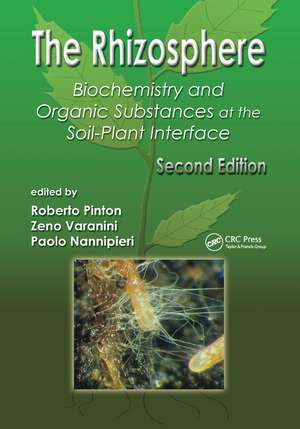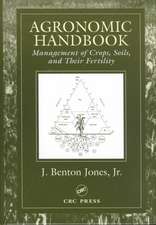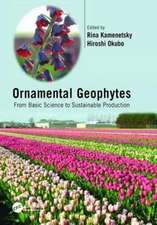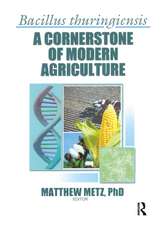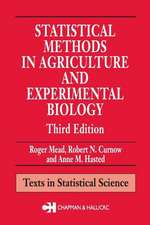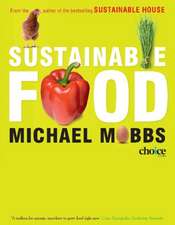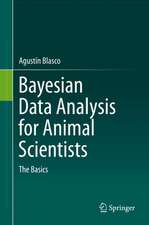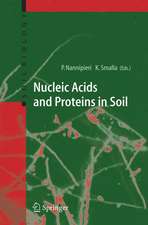The Rhizosphere: Biochemistry and Organic Substances at the Soil-Plant Interface, Second Edition
Editat de Roberto Pinton, Zeno Varanini, Paolo Nannipierien Limba Engleză Paperback – 23 sep 2019
Drawing on the expertise of pioneers in the field, The Rhizosphere: Biochemistry and Organic Substances at the Soil-Plant Interface, Second Edition contributes to the vigorous interchange between rhizosphere biochemistry and molecular biology to provide the most current information and stimulate further interest and research on this fascinating topic.
| Toate formatele și edițiile | Preț | Express |
|---|---|---|
| Paperback (1) | 504.80 lei 6-8 săpt. | |
| CRC Press – 23 sep 2019 | 504.80 lei 6-8 săpt. | |
| Hardback (1) | 1345.92 lei 6-8 săpt. | |
| CRC Press – 11 mai 2007 | 1345.92 lei 6-8 săpt. |
Preț: 504.80 lei
Preț vechi: 593.88 lei
-15% Nou
Puncte Express: 757
Preț estimativ în valută:
96.59€ • 105.25$ • 81.39£
96.59€ • 105.25$ • 81.39£
Carte tipărită la comandă
Livrare economică 23 aprilie-07 mai
Preluare comenzi: 021 569.72.76
Specificații
ISBN-13: 9780367389123
ISBN-10: 0367389126
Pagini: 472
Dimensiuni: 178 x 254 x 28 mm
Greutate: 0.88 kg
Ediția:2nd edition
Editura: CRC Press
Colecția CRC Press
Locul publicării:Boca Raton, United States
ISBN-10: 0367389126
Pagini: 472
Dimensiuni: 178 x 254 x 28 mm
Greutate: 0.88 kg
Ediția:2nd edition
Editura: CRC Press
Colecția CRC Press
Locul publicării:Boca Raton, United States
Public țintă
Academic and Professional ReferenceCuprins
Types, Amounts, and Possible Functions of Compounds Released into the Rhizosphere by Soil-Grown Plants, The Release of Root Exudates as Affected by the Plant Physiological Status, Rhizodeposition and Microbial Populations, Nutrient Transformations in the Rhizosphere, Nutrients as Regulators of Root Morphology and Architecture, Root Membrane Activities Relevant to Nutrient Acquisition at the Plant–Soil Interface, Function of Siderophores in the Plant Rhizosphere, Mycorrhizal Fungi: A Fungal Community at the Interface between Soil and Roots, Molecular Biology and Ecology of the Rhizobia–Legume Symbiosis, Biocontrol of Plant Pathogens: Principles, Promises, and Pitfalls, Chemical Signals in the Rhizosphere: Root–Root and Root–Microbe Communication, Modeling the Rhizosphere, Methodological Approaches to the Study of Carbon Flow and the Associated Microbial Population Dynamics in the Rhizosphere, Gene Flow in the Rhizosphere,
Notă biografică
Roberto Pinton, Zeno Varanini, Paolo Nannipieri
Recenzii
"The authors of the book describe interactions that occur at the soil-root interface, and provide a comprehensive and complex overview of the recent investigations. This edition explains the multidisciplinary nature of the rhizosphere, concerning soil science, agronomy, plant nutrition and physiology, microbiology and biochemistry. Information about rhizosphere biochemistry and molecular biology is reviewed by 34 contributors from 9 countries. The authors belong to leader scientists who are solving processes that take place in the rhizosphere. … The book is intended for advanced students and researchers in agricultural, biological and environmental sciences interested in widening knowledge about rhizosphere, provide the most current information and we hope that it stimulate further interest on this topic."
—E. Skrzypek and I. Czyczylo-Mysza
"All chapters of this nicely printed and bound book are arranged in a similar form of concise review articles with many figures and abundant list of references. The book will be undoubtedly of continuous interest to plant scientists, soil biologists and practicing plant ecologists as an invaluable source of basic information."
– J. Gloser, New Rapd Marker for Virus Resistance
"The main strength of this second edition is that it is on the topic of rhizosphere; despite the many research questions associated with this topic, there are few competing books and it is still an emerging field. Because the field is growing, I suspect this text will have a wide readership."
– Michelle Watt, in Annals of Botany, September 2009, Vol. 104, No. 4
—E. Skrzypek and I. Czyczylo-Mysza
"All chapters of this nicely printed and bound book are arranged in a similar form of concise review articles with many figures and abundant list of references. The book will be undoubtedly of continuous interest to plant scientists, soil biologists and practicing plant ecologists as an invaluable source of basic information."
– J. Gloser, New Rapd Marker for Virus Resistance
"The main strength of this second edition is that it is on the topic of rhizosphere; despite the many research questions associated with this topic, there are few competing books and it is still an emerging field. Because the field is growing, I suspect this text will have a wide readership."
– Michelle Watt, in Annals of Botany, September 2009, Vol. 104, No. 4
Descriere
Revised and expanded, the second edition provides comprehensive and updated treatment of recent advances in understanding the complex biochemistry of the soil-microbe-plant interaction. Adopting a molecular approach to explain biochemical processes at the soil-plant interface, new topics include the role of nutrient availability in regulating root morphology and architecture, the involvement of root membrane activities in determining and responding to nutritional conditions, and molecular signals between root-root and root-microbe as well as gene flow and the evolution of rhizosphere organisms and their co-evolution with plants.
